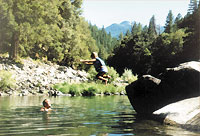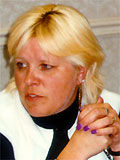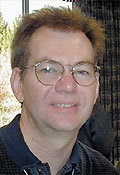|
ECL advocates stump on trams, in classrooms and for Tao Society.
By Jenny Coyle
It was the senator, not Sierra Club activist Sheila Bosworth who struck up the conversation.
 Bosworth,
an Iowa Chapter member, was in Washington, D.C., during a lobby week
for the Club's End
Commercial Logging on Federal Lands Campaign, and found herself
in one of the underground Senate tram cars with Sen. Conrad Burns,
a Montana Republican - and die-hard logging advocate. Bosworth,
an Iowa Chapter member, was in Washington, D.C., during a lobby week
for the Club's End
Commercial Logging on Federal Lands Campaign, and found herself
in one of the underground Senate tram cars with Sen. Conrad Burns,
a Montana Republican - and die-hard logging advocate.
Burns leaned forward and asked what Bosworth's button said. "Stop Logging Our National Forests," she said matter-of-factly, and a red-faced Burns replied somewhat less than diplomatically that Bosworth should be ashamed of herself.
|
Bosworth was just doing her part to educate the public about
the Club's campaign. She's the one who convinced Rep. Jim Leach
(R-Iowa) to author - along with Rep. Cynthia McKinney (D-Ga.)
- H.R. 1396, the bill to end commercial logging on federal lands.
Now she's always looking for co-sponsors.
|
 |
|
Sheila Bosworth
|
"The high point in the year 2000 was that we got 99 co-sponsors on
the bill," said Sean Cosgrove, the Club's national forest policy specialist,
who added with a chuckle, "The low point was that we got 99 co-sponsors
on the bill."
One more co-sponsor doesn't make a difference in whether the bill
begins its move through the committee process in the House. And in
fact, if George Brown (D-Calif.) hadn't passed away this year, the
campaign would have reached that goal.
"Sure, we'd like 100, and Rep. McKinney was eager for us to get there," said ECL Campaign Committee Chair Bernie Zaleha in Idaho. "But the big picture is that we got three times more than we had in the previous session of Congress. I'm sure we'll exceed 100 in the next session."
Zaleha, who spent three separate weeks in Washington, D.C., to lobby on the bill, said it's easier to build support when he can point out that the campaign is one of the Sierra Club's top four priorities. "They realize it's not just a 'feel good' piece of legislation," he said.
Only 4 percent of America's old-growth forests are still standing, and 75 percent of those remaining are within national forest boundaries. Not only is commercial logging allowed, but it's being subsidized by taxpayers at a huge loss - to the tune of $2 billion between 1992 and 1997, according to the federal General Accounting Office. More than 440,000 miles of roads now scar national forests, and the overwhelming majority of them were built for the logging industry and paid for by American taxpayers.
Zaleha has traveled the country talking about the importance of halting this travesty. He has addressed Club groups, chapters and regional conservation committees, as well as other organizations, like the Tao Society of Salt Lake City, where a student translated his speech for the native-born Chinese members. He has also discussed the Forest Service's activities on national forests in venues like an Arizona radio talk show called "See You in Court." And in December he gave the opening address to a conference in Hendersonville, N.C., organized by the Religious Campaign for Forest Conservation. The ECL committee co-sponsored the event.
The campaign published and distributed "Seeing the Forests for Their Green,"
a report written by two independent economists who prove that protecting
and restoring national forests produces more jobs and economic benefits
than logging does.
 |
Clyde Hanson, an ECL campaign committee
member and treasurer of the North Star (Minnesota) Chapter, held
a press conference in Duluth when the report was released, and
the ensuing media attention landed him in front of a classroom
at the University of Minnesota's School of Natural Resources. |
|
Clyde Hanson
|
"It was a course on the economics of natural resources, and the students
were about half conservation biologists and half foresters," said
Hanson. He talked about the ECL campaign and showed the campaign's
video, "This is Your Land." "It was a good way to target and educate
grad students who could be allies or valuable activists," Hanson said.
It wasn't all good news for the campaign, however. The passage of Sen. Ron Wyden's (D-Ore.) onerous "Clearcuts for Kids" bill, S. 1608, kept in place an outdated incentive for politicians in timber communities to advocate for logging.
"But we were able to stop the worst parts of the bill that would have mandated that counties use their funds for logging projects and raided Forest Service budgets for recreation and wilderness management," Cosgrove said.
In another setback, there was an increase in subsidies for logging in the Forest Service fiscal year 2001 budget.
"Our challenges in the coming year will be to continue our outreach to the public and Club members, build more congressional support, fight off pro-logging legislation and bad administrative policies, and gain more support among scientists, economists and other professionals," said Cosgrove.
Maybe they can get Sheila Bosworth to ride the Senate tram every day.
Photo credit:
(top) Supposedly Serene: It looks like a playful outing at the Scott
River on California's Klamath National Forest. But don't be deceived,
said Devorah Chirco-Macdonald of Aptos, CA, who won a photo contest
held by the End Commercial Logging on Federal Lands Campaign. "Logging
surrounds this area, and we heard and saw logging trucks constantly,"
she said. Contest organizers asked for pictures taken in national
forests where logging was under way, or where timber sales were planned.
Up to Top
|